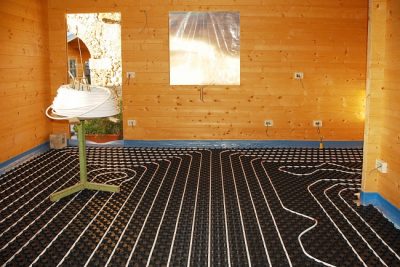Home Improvement
Heating and Cooling: Tips for Homeowners

When it comes to heating and cooling systems, we all want a comfortable home, but we also want to save money and be energy efficient. So, how can you achieve all of these goals simultaneously? The answer lies in selecting the right heating and cooling system for your needs, as well as maintaining and using it properly. In this ultimate guide, we will explore the importance of efficient heating and cooling systems, delve into the different types of systems available, and provide tips on how to save energy and money.
Why Efficient Heating and Cooling Systems Matter
Efficient heating and cooling systems are crucial for several reasons. First, they can save you money on energy bills. According to the U.S. Department of Energy, heating and cooling account for about 48% of the energy use in a typical home, making it the largest energy expense. When you invest in an energy-efficient system, you can significantly reduce these costs.
Second, efficient systems help to reduce your carbon footprint and contribute to a cleaner environment. This is because energy-efficient heating and cooling systems use less energy, which means fewer greenhouse gas emissions.
Finally, efficient heating and cooling systems can also improve the overall comfort of your home. A well-designed and properly maintained system will provide better temperature control, reduced humidity, and better air quality.
Types of Energy-Efficient Heating and Cooling Systems
Ductless Mini-Split Systems
A ductless mini-split system is a type of heating and cooling system that does not require ductwork. Instead, it consists of an outdoor unit and one or more indoor units that can be mounted on the wall or ceiling. These systems are highly energy-efficient because they avoid the energy losses associated with ductwork. Additionally, they offer the flexibility to heat or cool only the rooms you are using, which can save even more energy and money.
Heat Pumps
Heat pumps are another energy-efficient option for heating and cooling your home. They work by transferring heat between the indoors and outdoors, rather than generating heat like a traditional furnace or air conditioner. This makes them much more energy-efficient. There are two main types of heat pumps: air-source and ground-source. Air-source heat pumps extract heat from the outdoor air, while ground-source (or geothermal) heat pumps extract heat from the ground or a nearby water source.
Geothermal Heat Pumps
Geothermal heat pumps are a type of ground-source heat pump that uses the stable temperature of the earth to provide heating and cooling. These systems are highly energy efficient and can save you up to 60% on heating costs and up to 50% on cooling costs compared to traditional systems. Although they have a higher upfront cost, geothermal heat pumps can pay for themselves through energy savings within 5 to 10 years.
Annual Fuel Utilization Efficiency (AFUE)
When evaluating the efficiency of a heating system, one important factor to consider is its Annual Fuel Utilization Efficiency (AFUE) rating. AFUE is a measure of how efficiently a furnace or boiler converts fuel to heat. A higher AFUE percentage means a more efficient system. For example, a furnace with an AFUE rating of 90% converts 90% of the fuel it consumes into heat, while the remaining 10% is lost as exhaust.
To save energy and money, look for heating and cooling systems with an AFUE rating of at least 90%. Many high efficiency furnaces and boilers on the market today have AFUE ratings of 95% or higher.

Heating and Cooling
Tips for Energy-Efficient Heating and Cooling
Proper Maintenance
Proper maintenance is crucial for keeping your heating and cooling system running efficiently. This includes regularly changing or cleaning filters, cleaning the indoor and outdoor coils, and having a professional HVAC technician inspect and tune-up your system annually.
Programmable Thermostats
Installing a programmable thermostat can help you save energy and money by adjusting the temperature in your home when you are not there or when you are sleeping. According to the U.S. Department of Energy, you can save up to 10% a year on heating and cooling by simply turning your thermostat back 7-10 degrees Fahrenheit for 8 hours a day.
Sealing and Insulation
Ensuring that your home is well-sealed and insulated can significantly improve the efficiency of your heating and cooling system. This includes sealing air leaks around windows, doors, and other openings, as well as insulating your attic, walls, and floors. By doing so, you can reduce drafts, improve comfort, and save much energy.
Conclusion
Investing in an energy-efficient heating and cooling system is a smart decision that can save you money, reduce your environmental impact, and improve the comfort of your home. By understanding the different types of systems available, considering factors like AFUE ratings, and following tips for proper maintenance and energy-saving practices, you can make the most of your investment and enjoy the benefits of an efficient heating and cooling system for your home for many years to come.
Home Improvement
Tips for Hiring Fence Contractors in Austin, TX

A sturdy, well-designed fence is more than just a structure—it’s an investment in your property’s security, privacy, and aesthetic appeal. But finding the right fence contractor in Austin can feel overwhelming. With multiple companies vying for your attention, how do you know who to trust with your project?
This guide is here to help. Whether you’re looking for residential privacy fences, custom gates, or commercial fencing solutions, we’ll walk you through the key factors to consider, ensuring you make an informed decision.
The Importance of Choosing the Right Fence Contractor
Your fence serves multiple purposes beyond its visual appeal. It protects your property, defines boundaries, and can even increase resale value. A poorly installed or low-quality fence, on the other hand, can lead to frustration, higher maintenance costs, and reduced lifespan.
Selecting a contractor with a proven track record ensures your investment stands the test of time. Let’s explore how you can find the best partner for your fencing project.
What to Look for in a Fence Contractor
1. Experience and Expertise
Experience matters, especially when it comes to fence installation. Look for a contractor with a solid background in the industry and a proven record of delivering quality work. Checking how long a company has been operating in your area can provide insight into its reliability.
For example, Philmar Fence in Austin boasts years of industry expertise. Their team combines craftsmanship with local knowledge, ensuring every project aligns with the region’s specific requirements.
Pro Tip:
Ask contractors about their specialization. If you’re looking for a unique custom gate or handrail, you’ll want a company that excels in designing custom solutions.
2. Quality Materials
The longevity and durability of your fence depend significantly on the materials used. Ensure the contractor uses high-quality options that can withstand Austin’s fluctuating weather conditions, from the sweltering summers to unexpected thunderstorms.
Renowned companies like Philmar Fence prioritize robust materials, ensuring their fences maintain both beauty and functionality for years to come.
Questions to Ask:
- What materials do you recommend for my fencing needs?
- Are these materials eco-friendly and weather-resistant?
3. Reputation and Reviews
A contractor’s reputation speaks volumes about their professionalism and quality of work. Check online reviews, customer testimonials, and ratings on platforms like Google, Yelp, or the Better Business Bureau.
For example, Philmar Fence has built a strong reputation in Austin, with customers praising their attention to detail, reliability, and excellent customer service.
Action Step:
Don’t shy away from asking for references or examples of past projects. A credible contractor will happily provide photos or contacts of satisfied clients.
4. Transparent Quotes and Pricing
A trustworthy fence contractor offers clear, detailed quotes outlining costs, timelines, and materials. Be wary of vague estimates or hidden fees.
At Philmar Fence, customers receive a comprehensive breakdown of project details, ensuring there are no surprises along the way. This commitment to transparency builds trust and sets them apart from competitors.
Key Considerations:
- Does the quote list all costs, including labor and materials?
- Does the contractor allow for adjustments to fit your budget?
5. Licensed and Insured
Working with a licensed and insured contractor protects you from liability in case of on-site accidents or property damage. Always verify that the contractor holds the necessary credentials and is compliant with local regulations.
Philmar Fence, for example, operates with all appropriate licensing and insurance, guaranteeing peace of mind for their customers.
What to Check:
- Request proof of licensing and insurance before signing a contract.
- Verify that permits will be handled, especially for projects requiring tall fences or unique materials.
How to Get Started with a Fence Contractor in Austin
Step 1: Assess Your Needs
Before contacting contractors, outline your goals. Do you need more privacy? Enhanced curb appeal? Security for pets or children? Knowing these specifics will help potential contractors provide tailored solutions.
Step 2: Compare Contractors
Make a list of at least three contractors to compare. Focus on their experience, reviews, and willingness to communicate throughout the process.
Step 3: Schedule a Site Visit
Invite contractors to visit your property. This allows them to assess your space and provide accurate estimates based on your specific requirements.
Step 4: Review the Contract
Read the final contract carefully, ensuring all agreed-upon details are included. This is your last chance to clarify expectations before work begins.
Why Philmar Fence is a Top Choice in Austin
With so many contractors in Austin, Philmar Fence stands out for several reasons:
- Unmatched Expertise: Years of experience ensure professional craftsmanship for every project.
- Custom Solutions: Whether it’s residential fencing or a commercial project, they tailor designs to meet your unique needs.
- High-Quality Materials: They use top-tier materials that can handle Austin’s challenging weather conditions.
- Reliability: From free quotes to on-time project completion, they prioritize customer satisfaction.
- Community Focused: Being a local business, Philmar Fence values relationships and serves the community with pride.
Their services range from residential fences to custom gates and handrails, making them a one-stop shop for all your fencing needs.
Questions to Ask Your Contractor Before Hiring
- How long have you been in business?
- What types of fences do you offer, and which do you recommend for my property?
- Can I see examples of your past projects?
- What’s your warranty policy for materials and installation?
- How long will the installation process take?
- Will you handle any necessary permits for the project?
By asking these questions, you’ll gain a clear understanding of what to expect and ensure you’re making the right choice.
Elevate Your Property with the Perfect Fence
A well-installed fence isn’t just functional—it’s an enhancement to your home or business that reflects your style and priorities. Choosing the right contractor makes all the difference in achieving this.
If you’re in Austin and looking for a trustworthy, experienced partner, Philmar Fence is ready to bring your vision to life. With their commitment to quality, professionalism, and customer satisfaction, you’ll enjoy a seamless fencing experience from start to finish. Visit our website https://philmarfence.com/
Home Improvement
What is Penthouse Hub?

Introduction:
Penthouse Hub stands at the forefront of the adult entertainment industry, offering a unique and sophisticated platform that goes beyond conventional norms. As a distinguished online space, it redefines the way individuals engage with adult content by blending luxury, exclusivity, and innovation. This introduction aims to shed light on the essence of Penthouse Hub, exploring its inception, objectives, and its position in the evolving landscape of adult entertainment.
Penthouse Hub’s Prime Location in Singapore
Situated in the heart of Singapore, Penthouse Hub boasts a prime location that adds an extra layer of allure to its offerings. This section delves into the strategic placement of Penthouse Hub, highlighting the city-state’s vibrant atmosphere and the advantages it brings to the platform. From convenient transportation options to exceptional local amenities, the prime location enhances the overall experience for users. We will explore how geographical positioning contributes to the uniqueness and attractiveness of Penthouse Hub in the realm of adult entertainment.
Exploring Penthouse Hub Features
Penthouse Hub prides itself on a rich tapestry of features and content, elevating the adult entertainment experience to new heights. This section delves into the diverse offerings that make Penthouse Hub a standout platform. From high-quality video content to interactive features, users are immersed in a world of luxury and sophistication. We will explore the variety of genres available, the platform’s commitment to discretion and user privacy, and the cutting-edge technology that enhances the overall viewing experience.
Penthouse Hub’s Exclusive Amenities and Features
Beyond standard adult content, Penthouse Hub takes exclusivity to another level with a range of amenities tailored for a discerning audience. This part of the article will detail the exclusive features that set Penthouse Hub apart from conventional platforms. From VIP memberships to personalized content recommendations, users can curate their experience, creating a space that aligns with their unique tastes. The article will also touch upon any innovative technologies or features that contribute to Penthouse Hub’s reputation as a premium adult entertainment destination.
The Experience of Using Penthouse Hub
Navigating Penthouse Hub is an intuitive and user-friendly experience designed to ensure seamless interaction with its content. This section provides a step-by-step guide on accessing and utilizing Penthouse Hub effectively. From the initial sign-up process to exploring various genres and features, users will gain insights into how to make the most of their subscription. The article will cover platform compatibility, user interfaces, and any additional tools or options that enhance the overall usability of Penthouse Hub.
The Benefits of Using Penthouse Hub
Using Penthouse Hub extends beyond mere entertainment—it’s an immersive experience with a multitude of benefits. This part of the article elaborates on the advantages users gain from choosing Penthouse Hub over other adult entertainment platforms. Whether it’s the diverse content library, advanced search options, or personalized recommendations, Penthouse Hub ensures users find what they desire with utmost convenience. Additionally, we’ll explore any exclusive perks for members, ensuring readers understand the value proposition that comes with a Penthouse Hub subscription.
This section aims to portray Penthouse Hub as not just a destination for adult content but as a comprehensive and rewarding platform that caters to the desires and preferences of its diverse user base.
Understanding Penthouse Hub’s Distinction
Penthouse Hub distinguishes itself from the plethora of adult entertainment platforms through a combination of unique features, values, and a commitment to excellence. This section delves into the aspects that set Penthouse Hub apart in a competitive market.
At its core, Penthouse Hub is not just about explicit content but is a curator of an upscale lifestyle. The article will explore how Penthouse Hub goes beyond conventional adult platforms by incorporating elements of luxury, exclusivity, and innovation. Whether it’s the use of cutting-edge technology, partnerships with industry leaders, or a commitment to artistic expression, Penthouse Hub emerges as a trailblazer in the adult entertainment industry.
The discussion will also touch upon the platform’s dedication to user privacy and ethical production standards. By fostering a safe and respectful environment, Penthouse Hub distinguishes itself as a platform that prioritizes the well-being of its users and contributors.
Readers will gain insights into why Penthouse Hub has become a symbol of sophistication within the adult entertainment space and how its distinctive features contribute to its enduring popularity.
Navigating Potential Concerns
Potential Controversies and Criticisms Surrounding Penthouse Hub
While Penthouse Hub stands out for its innovative approach to adult entertainment, it is not immune to criticisms and controversies. This section addresses potential concerns that users or critics may raise, offering a transparent view of Penthouse Hub’s landscape.
One common concern revolves around the societal impact of adult content. The article will explore how Penthouse Hub addresses ethical considerations, ensuring that content production aligns with industry standards and legal regulations. This discussion aims to shed light on Penthouse Hub’s commitment to responsible adult entertainment, potentially mitigating concerns related to societal impacts.
Another aspect to be covered is the potential for data security and privacy issues. The article will delve into the measures Penthouse Hub has in place to protect user information and maintain a secure online environment. This includes encryption protocols, privacy policies, and ongoing efforts to adapt to evolving cybersecurity threats.
Frequently Asked Questions
Penthouse Hub extends beyond being a digital platform, offering an immersive experience that extends to luxurious living spaces. This section addresses common questions potential residents may have about living in the Penthouse Hub, providing insights into the residential aspect of this unique lifestyle.
Do penthouse units cost more?
Living in the Penthouse Hub is synonymous with luxury, and this naturally raises questions about the associated costs. This part of the article breaks down the factors influencing the cost of penthouse units within the hub. It covers considerations such as location, amenities, and the level of exclusivity, providing prospective residents with a comprehensive understanding of the financial aspects involved.
Are penthouses noisy?
Noise levels can significantly impact the quality of living, especially in upscale residential spaces. The article explores how Penthouse Hub addresses potential noise concerns, detailing the measures in place to ensure a serene living environment. From soundproofing technologies to community guidelines, readers will gain insights into how Penthouse Hub maintains a balance between vibrant entertainment and peaceful residential living.
Do penthouses have lots of stairs?
The physical layout of penthouses is a practical consideration for potential residents. This section addresses accessibility concerns, outlining the typical architectural features of penthouse units within the hub. Whether it’s the use of elevators, unique floor plans, or accessibility accommodations, readers will understand how Penthouse Hub caters to diverse preferences and needs.
Can I renovate a penthouse?
Individualization is key to creating a personalized living space. Here, the article explores the possibilities for residents to renovate or customize their penthouse units within the Penthouse Hub. It covers any restrictions, guidelines, or collaborative efforts with designers and architects to ensure that residents can tailor their living spaces to align with their preferences.
Is a penthouse difficult to maintain?
Maintaining a penthouse involves considerations beyond the standard residential upkeep. This part of the article provides insights into the maintenance aspects of living in the Penthouse Hub. From dedicated concierge services to community support, readers will gain an understanding of how Penthouse Hub simplifies the challenges associated with maintaining a luxurious living space.
By addressing these frequently asked questions, this section aims to provide a comprehensive overview of the residential experience within the Penthouse Hub, making it an enticing prospect for those seeking a blend of upscale living and cutting-edge adult entertainment.
Penthouse Hub’s Prime Location in Singapore
Singapore, a global hub of innovation and luxury, serves as the perfect backdrop for Penthouse Hub’s exclusive residential and entertainment offerings. This section explores the prime location of Penthouse Hub in Singapore, shedding light on the unique advantages and amenities that come with this strategic placement.
Transportation
One of the key factors contributing to the allure of Penthouse Hub’s location is its accessibility. The article outlines the convenient transportation options available in and around the hub. Whether it’s proximity to major airports, efficient public transit, or exclusive private transportation services, residents of Penthouse Hub enjoy seamless connectivity that enhances their overall lifestyle.
Amenities
Beyond the walls of the penthouse units, Singapore offers a rich tapestry of amenities that complement the luxurious living experience provided by Penthouse Hub. This section explores the nearby amenities, including high-end shopping districts, world-class dining options, cultural attractions, and recreational spaces. By delving into the surrounding lifestyle offerings, readers gain a holistic understanding of the elevated experience that comes with residing in the Penthouse Hub in Singapore.
Conclusion:
In conclusion, Penthouse Hub emerges as a pioneering force in the realms of both adult entertainment and luxurious living. Unveiling the platform’s essence, we explored its unique features, exclusive amenities, and the curated selection of the best penthouses, all contributing to an unparalleled user experience.
By addressing potential concerns transparently, Penthouse Hub showcases its commitment to responsible practices. Looking ahead, Penthouse Hub’s role in the evolution of adult entertainment is evident, with a forward-thinking approach that embraces innovation. Transitioning from the digital realm to luxurious residential spaces, the Penthouse Hub in Singapore seamlessly integrates upscale living with cutting-edge adult content.
Home Improvement
A Comprehensive Guide to Melbourne Rental Safety Checks

In the bustling cityscape of Melbourne, where urban living thrives, the safety of rental accommodations takes precedence. Melbourne’s unique blend of cultural diversity and modern living requires a robust framework to safeguard tenants’ well-being. To achieve this, Melbourne rental safety checks play a pivotal role. This guide deals with the intricacies of these checks, shedding light on their significance, procedures, and the role of rental safety providers.
Understanding Rental Safety Checks in Melbourne
Safety checks in Melbourne are essential processes that landlords and property managers undertake to ensure that rental properties are free from potential hazards. These checks thoroughly assess various aspects of a property to prevent accidents, promote tenant security, and comply with local regulations.
Key Aspects of Rental Safety Checks
Electrical Safety Inspection
Rental safety checks include an examination of the property’s electrical systems. Certified electricians assess wiring, sockets, and appliances to ensure they meet safety standards.
Gas Appliance Inspection
Gas appliances are inspected regularly to prevent gas leaks and potential fire hazards. This includes gas connections, heaters, and stoves.
Smoke Alarms and Fire Safety
Rental properties in Melbourne must be equipped with functional smoke alarms. These alarms are tested to ensure they provide early detection of fires.
Structural Integrity Examination
The structural stability of the rental property is assessed to identify any weaknesses that might pose a risk to tenants. This includes checking for cracks, unstable foundations, and other structural issues.
Plumbing and Water Safety
Water systems, taps, and plumbing are inspected for leaks and potential water contamination. Ensuring clean and safe water is crucial for tenant health.
Exterior Security Assessment
The property’s exterior, including doors, windows, and locks, is examined to prevent unauthorized access and enhance tenant security.
Role of Rental Safety Providers
Rental safety providers in Melbourne play a pivotal role in facilitating thorough safety checks for rental properties. These professional services collaborate with landlords and property managers to ensure properties adhere to safety regulations.
Services Offered by Rental Safety Providers
Comprehensive Inspections
Rental safety providers conduct meticulous assessments of properties, identifying potential hazards and risks that might compromise tenant safety. Thorough examinations cover structural integrity, electrical systems, gas appliances, and more.
Documentation and Reports
After each safety check, detailed reports are generated. These reports outline the current condition of the property, any necessary recommendations for improvement, and photographic evidence of findings.
Maintenance Recommendations
Rental safety providers offer guidance on maintenance and repairs, helping landlords rectify any safety issues promptly. Timely actions based on these recommendations enhance overall property safety.
Regulatory Compliance
Staying up-to-date with Melbourne’s rental safety regulations can be challenging. Rental safety providers ensure that properties comply with the latest safety standards by offering expertise in navigating evolving legal requirements.
The Importance of Regular Checks
Regular Melbourne safety checks for rental properties are legally required and essential for maintaining a safe living environment for tenants. These checks proactively identify and address potential hazards, reducing the likelihood of accidents and injuries.
Tenant Awareness and Education
Tenants themselves can contribute to rental safety by being aware of safety features in their rental properties. Understanding the location of fire extinguishers, emergency exits, and basic safety protocols can significantly enhance tenant security.
Melbourne rental safety checks are a vital aspect of this responsibility, guaranteeing that accommodations are secure and hazard-free. With the guidance of rental safety providers and the cooperation of landlords, these checks contribute to a safer living environment for everyone. By adhering to rigorous safety measures, Melbourne showcases its commitment to the well-being of its residents, establishing itself as a city that values safety as a top priority.
-

 Business3 months ago
Business3 months agoWhat to Know Before You Start a Business?
-

 Travel2 months ago
Travel2 months agoSave on Campervan Rentals with a roadsurfer Gutscheincode
-

 Travel2 months ago
Travel2 months ago10 Things to Do in Punta Mita
-

 Travel2 months ago
Travel2 months agoBest Things to Do in New York City – Ultimate Travel Guide
-

 Real Estate2 months ago
Real Estate2 months agoHow to Be the Best Real Estate Agent Murfreesboro
-

 Real Estate2 months ago
Real Estate2 months agoFind the Best Real Estate Agents Main Line
-

 Real Estate1 month ago
Real Estate1 month agoExplore New Real Estate Programs in Marrakech
-

 Health2 months ago
Health2 months agoGuide to Buying Testosterone Propionate Safely and Effectively





















